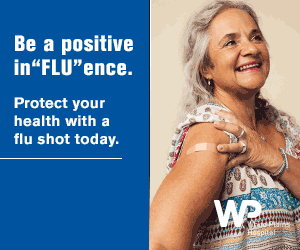Hope Is on the Way for Cancer Patients
- Details
- Written by: Bill Doescher
- Category: Health
 Chair Annmarie Formato and Dr. Larry Norton of Memorial Sloan KetteringThe packed house of guests at the Scarsdale Golf Club (SGC) who attended the Cancer Support Team (CST) ‘s 25th Annual Gayle K. Lee Health Education Luncheon on Thursday, October 17 came away with a most positive message: “Hope is definitely on the way for the cancer patients of today and tomorrow.”
Chair Annmarie Formato and Dr. Larry Norton of Memorial Sloan KetteringThe packed house of guests at the Scarsdale Golf Club (SGC) who attended the Cancer Support Team (CST) ‘s 25th Annual Gayle K. Lee Health Education Luncheon on Thursday, October 17 came away with a most positive message: “Hope is definitely on the way for the cancer patients of today and tomorrow.”
Why? Because Larry Norton, MD, the featured luncheon speaker and one of the country’s most highly recognized and respected oncologists, told them so.
Norton had a supporting cast to back him up, including Luncheon Committee Chair Annmarie Formato, former registered CST nurse Geraldine Durkin who received a special recognition at the luncheon, and current CST nurse Caridad Aponte, who provided an opening prayer with a wonderful message of hope.
In introducing Norton to the gathering, Formato praised him for his personal work on her on a breast cancer case for 25 years.
“You’ll be fine, you will be fine.”
Among other things, Formato said, “It was 25 years ago, at the age of 32, when I was diagnosed with breast cancer. I had just given birth to my daughter Avery, and my son Austin was only 2-1/2 years old. At that time in my life, breast cancer was a foreign language. I didn’t know anyone who had breast cancer. . .I had my surgery at Memorial Sloan Kettering (MSK), and I remember my surgeon telling me, ‘I don’t know who I’ll have to call to make this happen, but you must have Larry Norton as your oncologist’ . . . When I met Dr. Norton, he said, you’ll be fine, you will be fine.”
The emotional doctor-patient hug at the podium said it all.  CST Staff
CST Staff
In his remarks, the renowned oncologist, MSK’s Norna S. Sarofin Chair of Clinical Oncology as well as MSK Senior Vice President in the Office of the President and Medical Director of the Evelyn H. Lauder Breast Cancer Center there, cited important new cancer research his own organization and others were conducting. Surprisingly, he also noted that Artificial Intelligence was a powerful tool in advancing cancer research and is being used to help analyze the large amounts of data that have been gathered in search of cures and how to properly go about using them. “AI can indeed analyze all kinds of data,” he said.
In addition, without a prepared speech, Norton enthusiastically explained the advances in cancer treatment. In medical terms, he talked about the value of research into personalized cancer vaccines. In addition, Norton advocated for active patient/doctor partnerships in care. In particular, Norton discussed the important need for patients to carefully analyze all treatment possibilities, be prepared to ask their doctors good questions, and then listen very carefully.
“Take advantage of the many advances.”
 Gayley Henry and Tania Weiss
Gayley Henry and Tania Weiss
“The big question for you,” Norton said, “is how to take advantage of the many advances.” In providing plenty of doctor-to-patient advice, Norton emphasized that it’s extremely important for cancer patients to find the right doctor. And he said, which drew a chuckle from those in the audience, “If you think that you don’t like the doctor you selected, chances are he doesn’t like you either.”
Obviously, a favorite speaker for the CST folks, this wasn’t Norton’s first visit to CST’s annual luncheons. He was the speaker at CST’s fourth annual luncheon in 2002 and for the eleventh event in 2009. Somewhere down the road, you should fully expect he’ll be invited again if his schedule permits. He certainly does draw a crowd, and his expert advice is always on the money.  CST Patients
CST Patients
As staff was clearing the tables and smiling guests were exchanging goodbyes and leaving SGC, CST Executive Director Tania Weiss said, “It truly was a remarkable event. The luncheon is a fundraiser, and it certainly exceeded our goal. On behalf of our patients, we thank everyone who came and supported us to make this luncheon a huge success.”
The luncheon was a win-win for CST, because it increased awareness and raised necessary funds to support its main goal of helping cancer patients in Westchester County by providing professional and compassionate nursing education, rides to treatment, limited financial assistance and other supportive services – all free of charge.
Editor’s Note: Bill Doescher is a member of CST’s Advisory Board.
Why Get the Flu Vaccine? There Are Thousands of Reasons
- Details
- Written by: Joanne Wallenstein
- Category: Health
 (Submitted by Dr. Gary A. Zeitlin, Infectious Disease at White Plains Hospital)
(Submitted by Dr. Gary A. Zeitlin, Infectious Disease at White Plains Hospital)
You hear it every year at about this time: Don’t forget to get your flu shot. But there is a very good reason for that: simply put, not enough people are getting vaccinated.
Of course, 100% can be difficult to achieve in almost anything, but the numbers are especially concerning when it comes to fighting influenza. According to the latest available CDC data, in the 2022–23 flu season, 57.4% of children 6 months through 17 years were vaccinated, and only about 47% of adults over 18 were vaccinated. This is simply not enough.
Consider that, for the 2024 flu season in the U.S., the CDC estimates:
• 34 million to 75 million flu illnesses
• 15 million to 33 million flu-related medical visits
• 380,000 to 900,000 flu-related hospitalizations
• 17,000 to 100,000 flu-related deaths
According to the American Medical Association, some of the commonly heard reasons for not getting an annual flu shot include “I’m healthy” or “I got it last year.” The counterarguments here should be obvious: you may not stay healthy if you’re exposed to the virus, and since influenza is constantly mutating, last year’s vaccination will not be as effective as this year’s, which has been modified to take into account this year’s variety.
There is also the fact that many of us “got tired” of getting vaccinated after the multiple rounds during the pandemic. The fact remains that a flu vaccination is your best bet against what could range from some annoying sniffles to serious complications.
Incidentally, COVID is still very much around, and new boosters are available. I encourage everyone to get both vaccines, which can be received during the same appointment.
Flu vaccination is recommended for those six months and older every year for optimal protection, especially for groups at higher risk for developing complications, including:
• Adults 65 years and older
• Adults with chronic conditions including asthma, heart disease, stroke, diabetes, and chronic kidney disease
• Pregnant women Whether we ever get within striking distance of 100% compliance on getting the flu vaccine is impossible to foretell. However, the reality remains that receiving the vaccine is of considerable importance. Let’s all be a positive in”flu”ence. Schedule your shot today.
Whether we ever get within striking distance of 100% compliance on getting the flu vaccine is impossible to foretell. However, the reality remains that receiving the vaccine is of considerable importance. Let’s all be a positive in”flu”ence. Schedule your shot today.
Dr. Gary Zeitlin is an attending physician and Director of the Infectious Disease Division at White Plains Hospital. To make an appointment for a flu shot, call 914-849-MyMD.
Health Matters
The original version of this article was published in Health Matters, a White Plains Hospital publication.
Next-Gen Pacemakers Now Available at White Plains Hospital
- Details
- Written by: Joanne Wallenstein
- Category: Health
 Every year, around 250,000 people in the U.S. receive a cardiac pacemaker to help steady their heartbeat, according to research estimates. Now, many will qualify for a new type of pacemaker: an innovative, dual-chamber wireless option. White Plains Hospital is the first hospital in the state north of New York City to offer this technology to its patients.
Every year, around 250,000 people in the U.S. receive a cardiac pacemaker to help steady their heartbeat, according to research estimates. Now, many will qualify for a new type of pacemaker: an innovative, dual-chamber wireless option. White Plains Hospital is the first hospital in the state north of New York City to offer this technology to its patients.
A pacemaker is often recommended for patients whose heart rate is too slow and are having symptoms like fainting or dizziness. Traditionally, the device is implanted close to the shoulder, with wires connecting it to the heart. This new technology—the AVEIR DR dual-chamber leadless pacemaker system—means no wires are necessary at all.
As a result, “patients will now be able to have a pacemaker that they don’t see or feel. It’s working in the background and they don’t have a constant reminder,” says Dr. Marc Waase, Ph.D., a board-certified Cardiac Electrophysiologist and Director of Cardiogenetics at the White Plains Hospital Center for Advanced Medicine & Surgery.
Also key: The new technology can be offered to a greater number of patients, including those on dialysis who were previously not eligible for a pacemaker. “Almost everybody who needs a pacemaker is going to be eligible for the AVEIR DR dual-chamber leadless pacemaker system,” says Dr. Waase.
That’s in part because, as a dual-chamber pacemaker, it helps both the top and the bottom chambers of the heart work together. More than 80 percent of patients require this type of pacing. (Single-chamber wireless pacemakers already exist, but these are only helpful for the small number of people who need pacing in just one chamber, Dr. Waase explains.)
Here’s how the AVEIR DR pacemaker works: Instead of being implanted in the shoulder, the leadless dual-chamber pacemaker is placed directly in the heart. During the minimally invasive procedure, which was first performed at White Plains Hospital in April 2024, a catheter is inserted into the groin. Then, two small devices are implanted directly into the top and bottom chambers of the heart. These two devices communicate with each other to establish steady heartbeat pacing.
Plus, there is no scarring and no shoulder-activity restrictions. “[In the past] we’ve limited patients’ activity with their arms—no lifting, playing tennis, playing golf. Now that restriction will be lifted because they don’t have that device in their shoulder,” says Dr. Waase. The device is estimated to last as long as 20 years, compared to a traditional pacemaker’s 10 to 12 years. Traditional wired pacemakers will still be used in specific cases, such as for people with heart failure. And Dr. Waase doesn’t recommend patients who currently have a pacemaker switch to the new technology unless there’s an issue with their device.
Traditional wired pacemakers will still be used in specific cases, such as for people with heart failure. And Dr. Waase doesn’t recommend patients who currently have a pacemaker switch to the new technology unless there’s an issue with their device.
Overall, as Dr. Waase notes, “This is state-of-the-art technology that gives our patients more options and is an innovative, important step forward in the care we provide here at White Plains Hospital.”
Dr. Marc Waase is a board-certified cardiac electrophysiologist and Director of Cardiogenetics at the White Plains Hospital Center for Advanced Medicine & Surgery. For an appointment, call 914-849-2690.
Health Matters
The original version of this article was published in Health Matters, a White Plains Hospital publication.
Osteoporosis: What to Know
- Details
- Written by: Joanne Wallenstein
- Category: Health
 ( Submitted by Dr. Mythili Murthy, Endocrinology, Diabetes & Metabolism)
( Submitted by Dr. Mythili Murthy, Endocrinology, Diabetes & Metabolism)
As we get older, we lose bone mass—often gradually, and never noticeably. That’s why the condition of brittle bones, known as osteoporosis, is often called the “silent disease.” It progresses without symptoms until a bone easily breaks from a minor fall or even from something as ordinary as bending, lifting, or coughing. But osteoporosis doesn’t have to come as a surprise. Becoming familiar with your risk, warning signs, and preventative care can help you stay strong and prevent potential injuries.
Here, Dr. Mythili Murthy, Endocrinologist at White Plains Hospital Physician Associates, explains who is at risk for osteoporosis, shares strategies for prevention and detection, and notes the perks of personalized care. Here are tips to keep in mind:
1. Start to monitor during menopause. One of estrogen’s roles as a hormone is to regulate and replenish the production of new, healthy bone cells, explains Dr. Murthy. When estrogen levels decrease, usually starting at around age 50, bone density often follows suit. That’s why menopausal women are especially at risk. (For men, 70 is the age linked with a higher chance of osteoporosis.)
2. Cut back on smoking, alcohol, and coffee. “We know that smoking cigarettes and drinking excessive alcoholic or caffeinated beverages can hasten loss of bone density,” Dr. Murthy says. She advises no more than two cups of coffee per day to retain bone strength—or, if needed, to rebuild it.
3. Ask your doctor about scheduling a DEXA scan, an imaging test that assesses the density of your bones by measuring their mineral content. Results can indicate whether your bone density is normal,
slightly thin, or very thin. Slightly thin density is called osteopenia; very thin density indicates osteoporosis. DEXA scans should be repeated every one to two years.
4. Practice weight-bearing and strength-training exercises. Dr. Murthy recommends exercises such as walking, climbing stairs, or lifting weights for 30 minutes a day, three to four times a week. In terms of rebuilding bone strength, these are preferable to cardio exercises, she says.
5. Eat your spinach, drink your smoothie. “Calcium is among the most important minerals for strengthening bones. We recommend 1,200 mg a day, chiefly through the foods you eat,” says Dr. Murthy. You don’t have to pop extra calcium tablets if you’re having a daily cup of milk, a container of yogurt, a serving of leafy green vegetables, a handful of almonds or entrees with tofu or fish.
6. Vitamin D is the other important supplement, working in tandem with calcium to fortify bones. “Because Vitamin D comes from exposure to the sun, most people in our region have low levels so it’s important to take supplements,” Dr. Murthy says. “The standard dose is 2,000 IU, but it varies.” It is important to note that wearing sunscreen does not block Vitamin D. 7. Consider bone-building medications. “There are a range of options, from daily oral medication to monthly injections to yearly IV infusions,” explains Dr. Murthy. “It’s based on the individual and what best suits their needs. Each treatment has different side effects. For example, some oral medications trigger acid reflux, so we switch that patient to a yearly infusion. Other patients come to us with advanced osteoporosis, which might result in a decision to perform monthly injections for bone stability.”
7. Consider bone-building medications. “There are a range of options, from daily oral medication to monthly injections to yearly IV infusions,” explains Dr. Murthy. “It’s based on the individual and what best suits their needs. Each treatment has different side effects. For example, some oral medications trigger acid reflux, so we switch that patient to a yearly infusion. Other patients come to us with advanced osteoporosis, which might result in a decision to perform monthly injections for bone stability.”
Dr. Mythili Murthy is a board-certified internist and endocrinologist at WPHPA of Harrison. For an appointment, call 914-835-0073.
Health Matters
The original version of this article was published in Health Matters, a White Plains Hospital publication.
A Range of Treatments for Prenatal Kidney Issues
- Details
- Written by: Joanne Wallenstein
- Category: Health
 (Submitted by Dr. Amanda C. North, Pediatric Urology at White Plains Hospital)
(Submitted by Dr. Amanda C. North, Pediatric Urology at White Plains Hospital)
Unlike conditions of the heart, liver, and other singular organs, most people can live normal lives with just one kidney. However, a condition called prenatal hydronephrosis – essentially the swelling of a kidney in a fetus or infant – may require medical intervention to make sure the developing child is on the right path to good health.
Prenatal hydronephrosis affects between 0.5 to 1% of all pregnancies. The condition is typically brought on by a buildup of urine in the kidney due to a blockage somewhere in the urinary tract – that is, the ureter, urinary bladder, or urethra. The most common type of blockage is a ureteropelvic junction (UPJ) obstruction, involving a blockage where the kidney joins the ureter, which is the thin tube that carries urine to the bladder.
In prenatal cases, hydronephrosis is usually diagnosed during the second trimester via ultrasound. One clue can be low levels of amniotic fluid in the womb; as a fetus’ urine is part of the amniotic fluid, a significantly low level of the latter may indicate that the fetus is not passing enough urine. A swollen abdomen in the fetus can also raise suspicions. In such cases, parents are referred to a pediatric urologist before the baby is born so that they understand and are prepared moving forward.
Usually a sonogram will be given on the newborn within 48 hours of birth; the delay is due to the fact that the amount of fluid in the kidneys depends upon how well hydrated the newborn is. Although hydronephrosis may correct itself, the pediatric urologist will assign a ranking of 1 to 3 to the infant’s situation, with 1 being a minimal case and 3 being a severe one. Persistent mild and moderate cases can often be treated through watchful waiting with or without preventative antibiotics, followed by ultrasounds to measure improvement.
Surgery may be necessary in severe cases, with the aim of reducing the pressure in the kidney by relieving the obstruction. A pyeloplasty, used to address a UPJ obstruction, involves removing the blocked part of the ureter and reconnecting the healthy portion to the kidney’s drainage system.
¬With the less common ureterovesical junction (UVJ) obstruction – a blockage at the point where the ureter joins the bladder – a ureterostomy may be performed. This involves disconnecting the ureter from the bladder and making a surgical incision called a stoma, which drains into a diaper. The ureter will later be re-inserted into the bladder as the baby grows. In older babies and children, the ureter may be reimplanted into the bladder directly without first requiring a ureterostomy.
Depending on the age and general health of the patient, robotic surgery may be an option. In any case, such operations usually take between 1 ½ and 3 hours and have a 97-98% success rate for patients of all ages.
The prospect of surgery for a baby is an emotional and complicated one for any parent. But there are solutions when it comes to prenatal hydronephrosis. Consult with your pediatrician and a pediatric urologist to get the right answers for you and your child. It is also important to note that hydronephrosis can occur at any age. Severe cases may lead to kidney damage and even kidney failure. Depending on the severity, dialysis or a kidney transplant may be advisable for older patients. The good news is that around 90% of hydronephrosis cases – whether prenatal or postnatal – do not require any intervention; they essentially resolve themselves, or the unaffected kidney does the job of both without any complications.
It is also important to note that hydronephrosis can occur at any age. Severe cases may lead to kidney damage and even kidney failure. Depending on the severity, dialysis or a kidney transplant may be advisable for older patients. The good news is that around 90% of hydronephrosis cases – whether prenatal or postnatal – do not require any intervention; they essentially resolve themselves, or the unaffected kidney does the job of both without any complications.
Dr. Amanda C. North is Chief of Pediatric Urology and an attending physician at the Children’s Hospital at Montefiore (CHAM). To make an appointment, call 914-849-5437.
Health Matters
The original version of this article was published in Health Matters, a White Plains Hospital publication.







